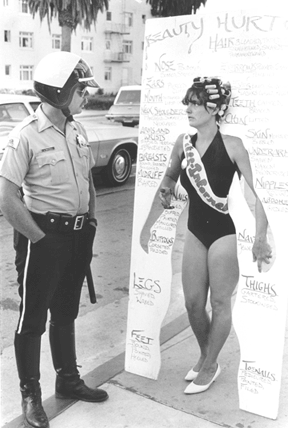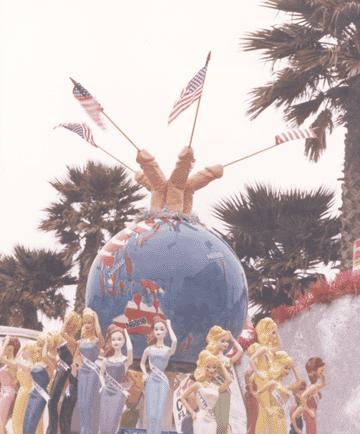 that the beauty ideal for women is a myth and a lie, and needs to be contested--not just this year, but always;
that the beauty ideal for women is a myth and a lie, and needs to be contested--not just this year, but always;
 MYTH CALIFORNIA:
MYTH CALIFORNIA:by De Clarke
"MYTH CALIFORNIA: But Is It Art Or Is It Politics" by Nikki Craft is a surreal art piece, both as finished product and during its creation (I was around for some of the intermediate stages). It consists of two parts. The first is a world globe (ceramic), about two feet in diameter, with candy-striped continents and blazing blue oceans, surmounted by five amazingly life-like penises in a bunch. The penises appear to be waving little American flags.
The second part is a crowd of 150 ceramic Barbie dolls, cast from real Barbie dolls; they surround the globe. Among them are three different costumes, but the color schemes vary widely. The whole piece, in fact, is colored with those obnoxious low-fire glow-in-the-dark glazes that make self-respecting potters shudder and turn away; the gloss is high enough to dazzle you.
The piece attempts to comment on the institution of beauty pageants in a number of ways. Some are pretty obvious, like the "bunch of white pricks sitting on top of the world" and the mass-produced sameness of the contestants. The disturbing sameness of all the contestants in any real beauty event is surreal itself--and a tribute to the rigidity of the U.S. Standard of Beauty--and here it is so accurately reproduced as to be chilling.
The peculiar mirroring of militarism that I see in this enforced conformity, its similarity to photographs of inductees, may be only in my head. I am not sure the artist had it in mind.
The "Myth" in "Myth California" is also a fairly open poke at the unreality and artificiality of sexist images of women ("real women"!). And more: local individuals and businesses have 'sponsored' and named certain dolls (typical names are Miss Aligned, Miss Ogyny, Miss Information). "Of course the contestants are not for sale! says the artist. "But you can get your name on one, for a price."
One of the artist's earlier pieces was a large wooden cutout called The Beauty Mold, into which women could try to fit. On the mold were written brief descriptions of the ways in which women are expected to alter their bodies in order to be beautiful. The 150 contestants in the Myth California Pageant are molded figures, and the slogan used for the Beauty Mold is repeated in ceramic letters on a glittering plaque: "No More Molds for Women."
Two other catch-phrases used in the piece are "Myth California: Never Again Uncontested" and "No More Profits off Women's Bodies." They are admittedly glib, and highly reduced, but each encapsulates a radical perspective on the issue of beauty:
 that the beauty ideal for women is a myth and a lie, and needs to be contested--not just this year, but always;
that the beauty ideal for women is a myth and a lie, and needs to be contested--not just this year, but always;
In short, the slogans together incite women to alter the very foundations of our culture, to attack the sacred idea of a beauty standard, and to resist and overcome the use of our bodies as commodities and slave labor.
On the globe are scattered stickers from Nestle's products. Nestle is one of the Pageant's (the 'real' Pageant's) major sponsors; McDonald's hamburger chain is another.
Nestle is also the company internationally indicted and boycotted for deceptive marketing of expensive baby formula in poor Third World countries, where people have neither the wealth to purchase enough of it nor the facilities to prepare it appropriately.
Some families in these countries might spend half their monthly income on one can of formula, and try to make it last a month when it was intended to feed a healthy baby for one week. The water that poor mothers use to mix the formula is often contaminated, and the technology for sanitizing it is not available to most people. Many times, the instructions are not in any language the mother can read.
Mother's milk, on the other hand, is available, naturally clean and nutritionally sound, and was universally used until Nestle personnel, posing as nurses, began entering hospitals and villages and telling new mothers that their milk was not good and that the formula was best for their children.
Thousands of children have fallen seriously ill and died, in Africa, Jamaica, and South America, from malnutrition, massive intestinal infection, or both--following Nestle's marketing ef forts in those regions, and after being inadequately fed with dishonestly advertised formula. International condemnation finally forced the corporation to promise an amendment of its practices, but no major changes have yet been observed. Hospitals, women's organizations, and progressive governments are struggling daily to save the already-damaged children and to educate their peoples to resist the company's deceitful tactics.
forts in those regions, and after being inadequately fed with dishonestly advertised formula. International condemnation finally forced the corporation to promise an amendment of its practices, but no major changes have yet been observed. Hospitals, women's organizations, and progressive governments are struggling daily to save the already-damaged children and to educate their peoples to resist the company's deceitful tactics.
This is the company that is proud to sponsor that sweet, wholesome, all-(white)-American tradition, the Miss Anywhere Contest. Nestle gains profits and publicity every year from the pageants it sponsors; winners and runners-up advertise Nestle's products (as well as eating at McDonald's!). The touching concern Nestle shows for the education and material well-being of America's beauty queens does not seem to extend to our Third World sisters and their babies . . .
The Nestle's stickers sprinkle the globe. The shimmering 150 clone-doll-women pose in baffling replication of each other. A token handful (art imitates life) are Black, or at least dark-skinned; but they are dressed and painted (art imitates life) to look as white as possible. The five giant penises with their patriotic flags tower over the whole scene, visible as soon as you take your eyes off the dolls and take a longer view (how art imitates life!).
This is one hell of a ceramic piece. You have to see it to believe it, as they say.
Why, it's as tacky, as transparent (symbolically), as gaudy, as bizarre and disturbing, as . . . the real thing.
Copyright © De Clarke 1983. All Rights Reserved.
The Nikki Wiki: All About Nikki Craft
Since October 3, 2001